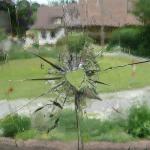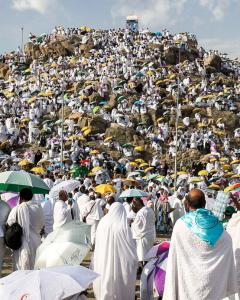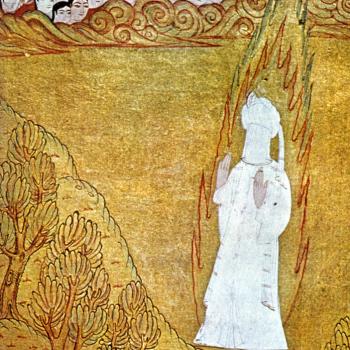
Sitting in a Quaker meeting recently, it occurred to me that if Muhammad (peace be upon him) were alive today he would feel very comfortable worshipping with these Christian friends. He was, after all, a man who had a daily practice of meditating in silence, and this is exactly what occurs in a Quaker meeting. There are no hellfire sermons and you won’t hear so many sentimental platitudes at a Quaker meeting. The Friends (as Quakers like to be known) simply sit in silence and journey inwards. If words arise in their hearts, they might stand and briefly say them. At their best, these words have a special quality – they have mysteriously ripened in the shared silence. Other times, nothing is said at all, yet the Friends receive a deep, indefinable nourishment. Here in Cumbria where the early Quaker movement crystalised some 400 years ago, you can feel the imprint of their quiet presence in the earth and trees.
Muhammad, who meditated in the cave on Mount Hira, knew this silence well. After the Muslim community had become established and was practicing the ritual prayer, it was his custom to turn around and face the congregation when the prayer was over, at which point they would sit together in silent meditation for some time. [i]
Silence is evoked by Shaikh Kabir Helminski in a talk concerning the friendship of Rumi and Shams:
The simplicity of Mevlana and Shams sitting together, and that in itself just being enough. They weren’t speculating on the nature of sin, or rewards of heaven, or on anything. They had entered another state. The sohbet, the companionship, of Shams and Mevlana was a great silence that revealed not only the beauty and meaningfulness of silence but also the beauty and the meaningfulness of words which can only be appreciated in contrast to silence, and those meaningful words that emerge out of that silence.[ii]
The kind of meditation practised by Muhammad, by the Sufis, and by the Quakers assumes that there is something within the human heart that connects us to our Divine Source. It is therefore worth sitting in receptive silence before the heart and possibly allowing it expression once a connection has ripened. Doing so allowed Muhammad to receive and communicate revelation. Revelation may be reserved for the prophets, but a heart relationship to the Divine is surely a birthright of all human beings.
Outside Sufi circles, how many Muslims today are even aware of Islam’s meditative tradition (muraqabah), let alone the concept of presence (huzur) which it seeks to cultivate? If ritual prayer lacks presence, then it is merely empty ritual. But would Muhammad encounter presence in today’s mosques? Would he find safe spaces where men and women could, after sitting in silent meditation, express themselves from their hearts without fear of judgement?
Add to this the following thought: In his own time, Muhammad was a great social activist, and today he might find the trajectory of his progressive activism continued by the likes of the Quakers. The dominant Muslim mentality, on the other hand, idolises the time of the Prophet, as if the intervening 1400 years have seen no cultural or ethical advances. The assumption is that if the Prophet were to return he would hope to find nothing changed – a tragic mistake, as he would surely be pushing us on towards greater equality than was possible in his own time.
Of course, Jesus (peace be upon him) would likewise struggle to find the spirit of his teaching in mainstream churches (Quakers are exceptional rather than the norm). Perhaps religious labels like “Muslim” and “Christian” are increasingly less meaningful to us today. Whilst I self-identify as a Muslim, sometimes silence may be the best response when asked about my religious affiliation. Sometimes the term “Muslim” triggers too many misconceptions about who I am and what I stand for, even among fellow Muslims. Matthew Wright, a fellow traveller on the Sufi path of Mevlana Rumi, who happens also to be an Episcopal priest, expresses it beautifully:
Might dervishhood, this path of the lover, speak uniquely to the pluralistic (and often post-religious) world we live in?—a world where traditional religious forms often seem to divide more than unite? It could be said that in these times we do not need more Muslims, Christians, Hindus, Buddhists, or Jews—but rather, more mature or completed human beings. On the Mevlevi path, growth in love—human maturation—is our primary concern.[iii]
An open-hearted Muslim has far more in common with an open-hearted Christian than with a Muslim whose heart is closed or whose approach to faith is rigid and dogmatic. And whether or not we believe Jesus was divine (and other doctrinal beliefs) are of less significance than whether or not we can live in the spirit of his teaching (in essence the same as Muhammad’s). Rumi understood this: despite being a devout Muslim, he never asked his Christian followers (or followers of other faiths) to convert to Islam.
Yet the labels “open-hearted” and “closed-hearted” are only useful if we can see the distinction at play firstly within ourselves, and only secondarily at play in the world outside. In one moment I may be present with an open heart, in the next my heart may have closed and I may have slipped into a judgemental, mechanical mindset. We have our inspired states and our blind spots, as well as our superficial postures. Where we fall on the spectrum in any given moment can vary, but this much we can say: We will tend to be drawn to those people who are magnetised by the same end of the spectrum as we are, no matter their religion.
Perhaps, then, interfaith worship is going to be of increasing importance in the years ahead, especially if humanity is not to sink into the soulless sleep that global consumerism and corporate greed seem to wish for us. Working together will not mean creating a mishmashed, one-world religion, but perhaps a bringing together of what Shaikh Kabir calls “the weapons of beauty” – poetry, music, movement, art, and prayer from different traditions, so that they can mirror and cross-pollinate to some degree whilst retaining their diversity and uniqueness. And perhaps such shared worship will be most effective when its foundation is silence, that formlessness from which the beauty of forms emerges. If there is one thing that consumer culture – with all its inane distractions – has an agenda to separate us from, it is this silence.
Today, interfaith events are all too often well-intentioned but lame affairs: people arrive distracted and full of chatter, there is a round of readings from each faith (often uninspired choices but few people are really listening anyway), and then there’s tea and cake where we vaguely talk of “doing something” to promote understanding and compassion. Everybody goes home underwhelmed. We are all guilty of such sleep-walking, but something else is possible.
Sitting in the Quaker’s interfaith meeting, my sense of what is normally missing from such events was brought into sharper focus. The Quaker’s event was much more of a success because the readings from various faith traditions were interspersed in a deep, expansive silence. They also included appropriate music which occasionally arose out of that silence. It was clear the Quakers understood that first and foremost the event needed to cultivate awakened being (though they may not have expressed it in those terms).
Being cannot be cultivated in just any silence. The silence experienced by a mind immersed in inner chatter, or a heart clouded with negative emotion, is very different to the silence experienced in a state of presence. Those leading the silent meditation need to have done some inner work on themselves, because their state entrains those around them. Likewise, they ideally need to know how to hold space: to be attentive to visual aesthetics, to be mindful of noise and grace of movement, to be conscious of how to give others the outer and inner space to find themselves. Aren’t these the qualities that the spiritual leaders of tomorrow will need, and the fruits of enlightenment that Muhammad or Jesus would quietly seek in today’s religious spaces?
[i] See https://sufism.org/library/articles/muraqabah-contemplation-in-the-mevlevi-tradition#_ftnref
[ii] See https://sufism.org/library/articles/unfold-the-wings-of-your-essence-2
[iii] See https://awakingheart.com/home/2018/11/27/dervishhood-and-the-times-we-live-in












